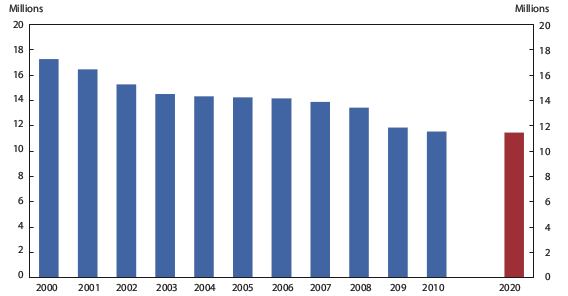The Robot Revolution
September 18, 2013
The
Luddites were members of an early
seventeenth century movement against
mechanization of textile crafts in
England.
Inventions of the
Industrial Revolution were replacing textile
artisans with
unskilled laborers, and the artisans were so concerned about their diminished status that they would smash these factory machines. In the end, the Luddites lost to the machines,
mostly through government intervention, and machines have won every subsequent battle.

Leader of the Luddites
This bold fashion statement is probably rooted in the same logic as the dress at the Boston Tea Party.
It's thought that the term, "Luddite," derives from the name of one of the earliest machine smashers, Ned Ludd.
(An 1812 lithograph, via Wikimedia Commons.)
Economists, who seem to be always secure in their employment, have been anti-Luddite in their sentiment. When they look at the big picture, only, such
technological unemployment may be bad for individuals, but it's good for business. In 1930, the noted economist,
John Maynard Keynes, wrote that
"We are being afflicted with a new disease of which some readers may not yet have heard the name, but of which they will hear a great deal in the years to come-namely, technological unemployment. This means unemployment due to our discovery of means of economizing the use of labor outrunning the pace at which we can find new uses for labor... But this is only a temporary phase of maladjustment."[1]
The pace of progress in 1930 was slow enough that the
social disruption caused by
automation was not that great, and not that many individuals were affected. Today,
technology's influence on the workplace is so rapid that even Keynes might backtrack from his statement. Keynes indicts himself by his prediction that we will work just fifteen hours a week in 2030, a
century after his statement. I don't see that trend. The problem is that workers are not
fungible; that is, an
automotive worker out of a job one week can't step into a
computer programming job the next.
Our lifestyle has been enhanced by
computers, but computers have been responsible for considerable unemployment. It's not just now that people are worried that they will be replaced by a computer. Thirty years ago, I saw a
cartoon of a
manager laughing behind his desk at a
redundant employee. The manager was saying, "...And the funny part is that the computer that's replacing you is smaller than the head of a pin."
Ten years after that, I was in a meeting at which a
corporate vice president, after hearing a
research presentation, told the
scientist he could probably be replaced by an
expert system. This was definitely not a morale booster. This same theme was in an episode (
Season 1, Episode 12) of the popular television series,
The Big Bang Theory. In that episode,
Sheldon told
Koothrappali he could be replaced by a simple computer program, and Koothrappali admits to his friends that the assessment is true.
There was a time when
corporations were attempting to convince their employees that "change is good," but I'm sure not many of the employees were actually convinced. One sure indicator of a problem is that more and more people are talking about it. This year, the technology
press has fielded quite a few articles on the idea that all of us are being replaced by
robots.[2-6]
In an article in
Technology Review,
David Rotman reports how
Erik Brynjolfsson, a
professor at the
MIT Sloan School of Management, and collaborator,
Andrew McAfee, associate director of the
MIT Center for Digital Business at the Sloan School of Management, not only blame computer technology for the sluggish employment growth of the last decade or more, they also claim that our now too rapid technological change has been destroying jobs faster than it's been creating them. Over this period, we still have
economic growth, but there's been no increase in employment.

Wage and salary employment in manufacturing for the United States, 2000–2010 and projected 2020. (Source: U.S. Bureau of Labor Statistics, Current Employment Statistics (historical data) and Employment Projections Program (2020 data).)
Although the
gross domestic product is still on the rise,
median income is stagnant. This violates a central tenet of employment that was known even to
Henry Ford. Ford decided that he could only sell cars if his employees, for example, could afford them. As they say, "
one hand washes the other." Brynjolfsson, as quoted in Technology Review, says the following,
"It's the great paradox of our era... Productivity is at record levels, innovation has never been faster, and yet at the same time, we have a falling median income and we have fewer jobs. People are falling behind because technology is advancing so fast and our skills and organizations aren't keeping up."
Brynjolfsson and McAfee have condensed their arguments into a short, 2011 book, Race Against the Machine.[7]
Ray Kurzweil sees 2045 as the year of the
singularity, the time at which machines become as intelligent as men.[6] At that point, the
evolution of life may jump from the present
biological track to the faster and more secure
artificial intelligence track.
Humans may not just become unemployed, they might become irrelevant. Perhaps we'll be kept as
pets.

(Bill Joy in 2003, via Wikimedia Commons.)
Bill Joy, co-founder of Sun Microsystems, wrote a 2000 article entitled,"Why the Future Doesn't Need Us," in Wired magazine. The sentiment of this article is the same as the scenario I outlined above. Wrote Joy, "Our most powerful 21st-century technologies - robotics, genetic engineering, and nanotech - are threatening to make humans an endangered species."[6]
When introduced into the workplace, robot workers need not be fully functional, as was Athena, who erupted from the head of
Zeus in full
armor.
Illah Nourbakhsh, a professor of robotics at
Carnegie Mellon University, writes that robots need not perform as well as humans, they just need to perform well enough.[3] The customer will experience lesser quality, but the corporation will save money and essentially doesn't care. Examples of this are the automated call systems we all detest. "Press nine to return to the main menu."
There are those who think that the robot threat to employment is overblown.
Robert D. Atkinson, president of the
Information Technology & Innovation Foundation, a
Washington, D.C.,
think tank, thinks that second-order effects negate the problem. In his view, the money saved by corporations results in lower prices and higher wages for the remaining workers. This extra spending money stimulates demand for the products of other companies, who would hire more workers to meet the demand. Atkinson says that technological progress has always been accompanied by higher overall employment.[8]
One consequence of increased automation has been a hollowing-out of the
middle class. employment in low skill service jobs, such as janitors, restaurant workers and home health aides has increased. So have high pay jobs involving creativity, often with the use of computers.[2] Digital technology has also enabled the rise of "
superstar" technologist who are paid handsomely for a
computer program that eliminates many jobs; for example,
tax compliance software that put
accountants out of business. Jobs traditionally supporting the middle class have diminished.
McAfee, as quoted in Technology Review, says that new technologies are
"...encroaching into human skills in a way that is completely unprecedented... The middle seems to be going away... The top and bottom are clearly getting farther apart."[2]
Brynjolfsson adds that "It's one of the dirty secrets of economics: technology progress does grow the economy and create wealth, but there is no economic law that says everyone will benefit."[2]
Jason Dorrier presents one
counterexample to all this doom and gloom. He writes in the
Singularity Hub that advances in
agricultural technology didn't just enrich a few. The abundance of food allowed people to pursue professions other than farming to their greater benefit and to society's benefit as well.[4]
References:
- John Maynard Keynes, "Economic Possibilities for our Grandchildren," 1930, in "Essays in Persuasion," W.W.Norton & Co. (New York, 1963), pp. 358-373.
- David Rotman, "How Technology Is Destroying Jobs," Technology Review, June 12, 2013.
- Illah Nourbakhsh, "It's Time to Talk about the Burgeoning Robot Middle Class," Technology Review, May 14, 2013.
- Jason Dorrier, "Robots Will Do Everything You Do Now Only Better—What Then?" Singularity Hub, April 28, 2013.
- Jason Dorrier, "Moshe Vardi: Robots Could Put Humans Out of Work by 2045," Singularity Hub, May 15, 2013.
- Moshe Y. Vardi, "The Consequences of Machine Intelligence," The Atlantic, October 25, 2012.
- Erik Brynjolfsson and Andrew McAfee, "Race Against the Machine: How the Digital Revolution is Accelerating Innovation, Driving Productivity, and Irreversibly Transforming Employment and the Economy," Digital Frontier Press (January 23, 2012), ISBN 978-0984725113, 98 pages (via Amazon).
- Robert D. Atkinson, "Stop Saying Robots Are Destroying Jobs—They Aren't," Technology Review, September 3, 2013.
Permanent Link to this article
Linked Keywords: Luddite; 17th century; seventeenth century; textile manufacture; mechanization of textile crafts; England; invention; Industrial Revolution; artisan; unskilled labor; government intervention; Boston Tea Party; Ned Ludd; Wikimedia Commons; economist; technological unemployment; John Maynard Keynes; social disruption; automation; technology; century; fungibility; fungible; automobile; automotive; computer programming; computer; cartoon; manager; layoff; redundant employee; corporate vice president; research; presentation; scientist; expert system; The Big Bang Theory, Season 1, Episode 12; Sheldon Cooper; Raj Koothrappali; mass media; press; robot; Technology Review; David Rotman; Erik Brynjolfsson; professor; MIT Sloan School of Management; Andrew McAfee; MIT Center for Digital Business; economic growth; employment statistics; US manufacturing employment, 2000-2020; U.S. Bureau of Labor Statistics; gross domestic product; median household income; Henry Ford; one hand washes the other; technological singularity; evolution of life; biology; biological; artificial intelligence; humans; pets; Bill Joy; Sun Microsystems; Why the Future Doesn't Need Us; Wired magazine; robotics; genetic engineering; nanotechnology; endangered species; Athena; Zeus; armour; armor; Illah Nourbakhsh; Carnegie Mellon University; Robert D. Atkinson; Information Technology & Innovation Foundation; Washington, D.C.; think tank; middle class; superstar; computer program; tax compliance software; accountant; Jason Dorrier; counterexample; Singularity Hub; agriculture; agricultural; John Maynard Keynes, "Economic Possibilities for our Grandchildren," 1930, in "Essays in Persuasion," W.W.Norton & Co. (New York, 1963); Erik Brynjolfsson and Andrew McAfee, "Race Against the Machine: How the Digital Revolution is Accelerating Innovation, Driving Productivity, and Irreversibly Transforming Employment and the Economy," Digital Frontier Press (January 23, 2012), ISBN 978-0984725113.